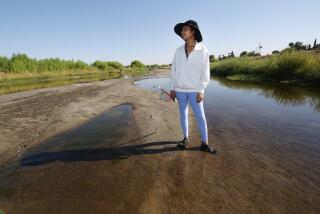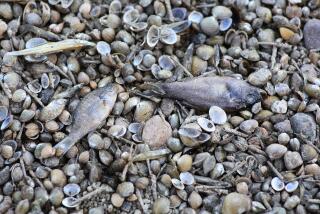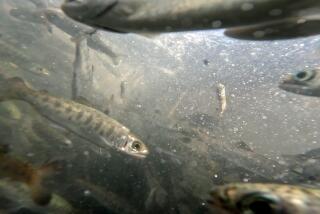On the depleted Kern River, rafting companies look to ride out the drought

In the Kern River Valley, a tourism-dependent community feels the effects of a severely low water year.
- Share via
Reporting from Bakersfield — Darron Nilsson navigated his truck down a dirt road to the Kern River. The trail, less traveled this year, opened up to a dusty clearing at the water’s edge.
Here, if the snowpack had not amounted to 5% of normal this spring, if the drought hadn’t been so unforgiving for three winters, if white-water rafting didn’t depend on, well, more water, Nilsson and his staff would be launching hundreds of rafters into the rushing rapids.
Instead, water levels are a 10th of what they could be, and Nilsson had to cancel his rafting season for the first time since he opened shop more than a decade ago.
He could hear the first rapid around the corner — once a roaring “wake-up rapid” to an exciting journey down the Kern. This day, it was a gentle gurgle.
“This is bittersweet,” he said. “I haven’t been down here all season.... I’ve been avoiding it.”
Dismal snowpack levels in the southern Sierra Nevada have forced rafting companies up and down the 165-mile Kern River to make tough business decisions this year. Some have written off 2015, while others are hanging on with creative business alternatives and fewer workers.
For decades, the mighty Kern — sometimes called the “Killer Kern” — has attracted adventurous visitors to one of the fastest-flowing rivers in the West. The Kern made headlines as recently as 2011 for its dangerous water level. As motorists enter the Kern River Canyon, traveling along the river from Bakersfield up to Lake Isabella and into the Sequoia National Forest, a sign flashes a reminder of wetter times: “271 lives lost since 1968.”
This year, the river is tamer, and Lake Isabella has dwindled to less than 8% of capacity. For those who live and work along the Kern, this is just part of the deal with Mother Nature. It’s a shame how the drought has dried up tourism in their community, they said, but each year is a year closer to the next wet one.
But staying afloat has not been easy. The Kern River Festival, which draws hundreds of professional and recreational paddlers each year, was canceled this spring for the first time in 51 years. Hotels and restaurants face another summer with fewer tourists.
On the lower end of the Kern, in Bakersfield, there were few options. Canceling the season made the most sense for Nilsson’s company, River’s End Rafting & Adventure.
He had to break it to 20 employees that they wouldn’t be working with him this summer.
“The river is our economy,” Nilsson said, examining the water, which eventually dumps into irrigation channels for thirsty farms. He noticed tall weeds poking out where water once flowed.
Pulling out his smartphone, he checked the water flow — 313 cubic feet per second. It needs to be at least 800 to 1,200 cfs for good rafting. The Kern has seen 4,000, he said.
“You can only survive on no snowpack for so long,” Nilsson said.
Last year, he helped cover operating costs by starting an adventure camp for kids and an “amphibian” land-and-water 5K. He still lost money.
This year, he’s hibernating. He points visitors to the upper Kern, where some rafting companies have stayed open by promoting scenic kayak trips and stand-up paddle-board lessons.
In Kernville, a close-knit tourist destination 40 miles up the river, Tom Moore, his sister and son talked hopefully about the signs pointing to a big El Niño — and potentially a wet winter.
“It’s the worst drought we’ve seen in the 30 years we’ve been here,” Moore said. But he has found ways to keep Sierra South Paddle Sports busy. He marveled at his recent discoveries on the river — hidden rapids that had been covered by higher water levels.
“We’ve sunk to new lows,” Moore said. “We have to have a sense of humor about it.”
Business hasn’t been easy. In a good year, on a Saturday, 600 to 700 people would be floating down this stretch of the river. Now, 150 people on the water is a good day. A rushing 20-mile journey has turned into a leisurely three-mile trip that avoids rockier sections of the river.
Moore’s large inflatable rafts gather dust, deflated and replaced by his growing fleet of kayaks. He hopes his season will last through August with activities that are more suitable for calmer waters: tubing, stand-up paddle boarding and kayak lessons.
He watched Javier Ruiz, one of his instructors, balance on a paddle board as he made deft turns down a rapid, through clusters of boulders. Three boys gaped as Ruiz powered by. A couple on their honeymoon laughed and shrieked as they careened after Ruiz on inflatable tubes, feet thrust into the sky. The strength of the current took them by surprise.
“It doesn’t take a lot of water to have a lot of fun,” Moore said.
Throughout the Kern River Valley, residents acknowledged that the drought had hit them pretty hard but said it could be a lot worse.
At Lake Isabella, which separates the upper and lower Kern, Lisa Wyly watched her 6-year-old daughter play in the mud where water used to be. It was a hike down, she said, pointing to faded water lines on slopes now wrinkled with tire tracks as cars drive closer to the receding lake.
“This used to be all wake boarding. There’d be party barges, water sailing, at least 20, 30 boats out there,” Wyly said. That day, the heat breaking 90 degrees, she could see three boats and a handful of trailers camped along the hollowed lake.
Her daughter still loves it here. Wading 20 feet out into the lake, she stretched out on her stomach, her chin barely touching the water.
“At least we still have a lake,” Wyly said. “Other lakes have dried up because of the drought.”
Back in Bakersfield, Nilsson’s wake-up rapid is a field of boulders with some bubbling water. He held his hand up to his chest: “We’d be standing in the river right here.
“I have no control over what flows down this river,” he said. “I just have to accept it.”
He pondered what to do for the rest of the day. The water looked refreshing, a promise of relief from the midday sun. He wants to go kayaking.
Twitter: @RosannaXia
More to Read
Sign up for Essential California
The most important California stories and recommendations in your inbox every morning.
You may occasionally receive promotional content from the Los Angeles Times.











